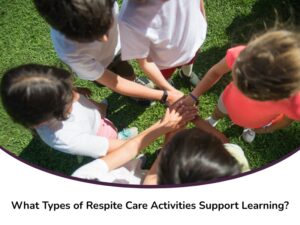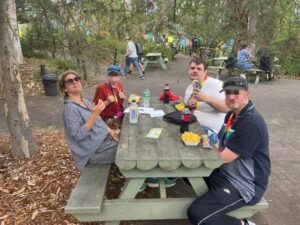
Structured respite care activities do more than fill time—they nurture growth, independence, and social connection. For school-aged children with disabilities, fun and inclusive routines during overnight care help reinforce emotional regulation, build confidence, and reduce anxiety. Activities like quad biking, swimming, basketball games, and nature walks aren’t just recreational—they’re strategic tools that support learning and personal development. When chosen thoughtfully, these experiences offer valuable life lessons while giving primary caregivers essential time to recharge. This guide explains which activities matter, why structure is essential, and how the right mix promotes stronger outcomes for both children and families.
Why do structured respite care activities matter for children?
Children need more than supervision—they benefit from activities that encourage progress, routine, and joy. A structured approach ensures predictability and meaningful engagement across all ability levels. Here are the benefits of structured activity plans:
- Inclusive routines foster confidence and independence. Repetition helps children feel competent, and that competence, in turn, builds self-esteem across various areas of life.
- Predictable days reduce anxiety and support emotional regulation. Without consistent routines, children often struggle to manage transitions and expectations.
- Physical activities like swimming and basketball build gross motor and social skills. These also encourage peer interaction through shared goals and movement.
- Nature-based outings offer calm, sensory-rich experiences. The environment itself becomes a therapeutic tool—soothing, stimulating, and grounded in routine.
- Carer-guided interaction strengthens trust. Familiar faces, structured support, and consistent encouragement help children develop a sense of emotional safety.
Unstructured environments increase anxiety and reduce trust, especially for children with sensory sensitivities. Structure makes participation feel safe and rewarding.
What challenges arise when activities aren’t properly planned?
Lack of planning can limit the effectiveness of respite care. Without structure, days can feel chaotic, leading to disengagement or behavioural issues. Here are the common problems with poorly planned activities:
- Disorganised routines create stress: Without predictability, children often act out or withdraw.
- Overstimulating or unsuitable activities overwhelm children: Sensory overload or mismatched skills can lead to meltdowns or a refusal to participate.
- Missed opportunities for confidence-building and growth: When activities aren’t tailored, children may not experience success or motivation.
- Inconsistent routines undermine learning: Skills don’t generalise if they aren’t repeated across settings.
- Peer dynamics suffer: Poorly timed or competitive activities may lead to social conflict, exclusion, or emotional distress.
Even something as exciting as quad biking can cause distress if it’s not introduced gradually or offered with the right support. That’s why engaging in structured respite care activities during school holidays—especially in a personalised, home-based setting—provides both the consistency and variety children need to thrive.
How do respite care activities influence social development?
Social growth doesn’t happen by chance. It develops through repeated, supported interactions—especially in settings where children feel secure and understood. Here are the social benefits of well-designed care activities:

- Basketball games and team tasks build patience, cooperation, and communication. These skills form the backbone of inclusive social participation.
- Nature walks offer calm, side-by-side social interaction.
- Group swimming promotes turn-taking, listening, and following instructions.
- Supported games reinforce both verbal and non-verbal communication. This includes reading body language, adjusting tone, and understanding rules.
- Shared responsibilities, like packing gear or tidying up, create chances for social learning. Children see how their actions affect others, which promotes empathy.
Children often gain more social confidence in care settings where they feel emotionally safe, supported, and understood, especially when activities are adapted to their pace and strengths.
Which respite care activities are best for school-aged children?
The best activities are both fun and developmentally aligned. They challenge without overwhelming and reflect the child’s strengths and goals. Here are the top activity options for school-aged children:
- Quad biking builds coordination and courage.
- Swimming offers sensory input, emotional regulation, and body awareness.
- Basketball fosters social learning through shared rules.
- Nature walks promote mindfulness and exploration.
Families interested in navigating respite care options for diverse needs should look for providers that offer a balanced mix of engaging, child-led activities in a supportive overnight home environment.
What tools can help plan daily care routines?
Planning tools help structure each day, making it easier for children to transition between tasks and stay engaged throughout their stay. Here are the top tools used in respite settings:
Tool | Purpose | Best For | Adaptability Level |
Visual schedules | Offer predictability and reduce anxiety | Kids with autism or anxiety | Highly customisable |
Choice boards | Support decision-making and increase engagement | All abilities | Medium – depends on visuals |
Timers and countdowns | Assist with transitions between activities | Sensory-sensitive children | Low – simple and effective |
Social stories | Prepare children for unfamiliar routines | First-time participants | High – requires personalisation |
Activity logs | Track engagement and emotional response | Long-term care planning | High – informs future sessions |
When these tools are paired with educational games that build communication skills, they strengthen a child’s overall learning profile and encourage independence.
Can group-based activities improve social interaction in care settings?
Group settings offer excellent opportunities for social learning, particularly when facilitated by skilled caregivers who effectively balance group dynamics with individual needs. Here are the benefits of group-based activity models:

- Team games promote collaboration, listening, and healthy competition. They also teach children how to manage both success and disappointment.
- Nature walks allow for shared discovery. Peer modelling and mutual curiosity strengthen the connection.
- Group art projects build patience and respect. Shared spaces and materials require communication and compromise.
- Storytelling circles support expressive and receptive language. Children learn to listen, wait their turn, and respond thoughtfully.
These shared experiences help carers better understand each child’s profile and inform long-term planning. Families may benefit from understanding their family eligibility for temporary care, which helps determine the most effective type and frequency of support.
While home-based respite care typically focuses on personalised, one-on-one support, children can still benefit from structured, small-scale group interactions, such as shared overnight stays with peers or planned outings that encourage social connection in a calm, supportive environment.
Are respite care activities key to long-term child growth?
Absolutely! Fun alone isn’t enough—structured respite care lays the foundation for lifelong progress. When activities like basketball or swimming are guided by trained carers and delivered in safe environments, children are more likely to practise independence, emotional regulation, and social communication. These skills extend into home, school, and community life. Whether packing for an overnight stay, navigating new peer relationships, or trying a new activity, children in respite build habits that support autonomy and resilience. For many, growth happens not in a single moment but through consistent, supported routines that celebrate capability.
Families across the Central Coast and surrounding regions can explore Our Family Respite’s creative care options to see how structured overnight stays and inclusive activities support learning and meaningful child development.

